Related Research Articles

An intermodal container, often called a shipping container, or cargo container, (or simply “container”) is a large metal crate designed and built for intermodal freight transport, meaning these containers can be used across different modes of transport – such as from ships to trains to trucks – without unloading and reloading their cargo. Intermodal containers are primarily used to store and transport materials and products efficiently and securely in the global containerized intermodal freight transport system, but smaller numbers are in regional use as well. It is like a boxcar that does not have wheels. Based on size alone, up to 95% of intermodal containers comply with ISO standards, and can officially be called ISO containers. These containers are known by many names: freight container, sea container, ocean container, container van or sea van, sea can or C can, or MILVAN, or SEAVAN. The term CONEX (Box) is a technically incorrect carry-over usage of the name of an important predecessor of the ISO containers: the much smaller steel CONEX boxes used by the U.S. Army.
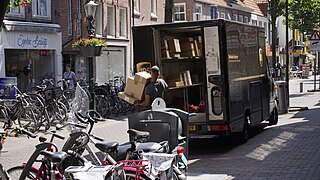
Package delivery or parcel delivery is the delivery of shipping containers, parcels, or high-value mail as single shipments. The service is provided by most postal systems, express mail, private courier companies, and less-than-truckload shipping carriers. Package delivery is different in each country, and how packages are delivered is closely connected with the cost for delivering to that country as well as population. In 2019, China, The United States, and Japan were the leaders in package delivery while Latvia, Macau, and Iceland were the bottom three. The population of the bottom three barely totals 2 million while the population of the top three tops totals more than 2 billion. Package delivery is an every day occurrence in the US while many other countries do not have this luxury.

In transportation, freight refers to goods conveyed by land, water or air, while cargo refers specifically to freight when conveyed via water or air. In economics, freight refers to goods transported at a freight rate for commercial gain. The term cargo is also used in case of goods in the cold-chain, because the perishable inventory is always in transit towards a final end-use, even when it is held in cold storage or other similar climate-controlled facilities, including warehouses.

A box is a container with rigid sides used for the storage or transportation of its contents. Most boxes have flat, parallel, rectangular sides. Boxes can be very small or very large and can be used for a variety of purposes, from functional to decorative.
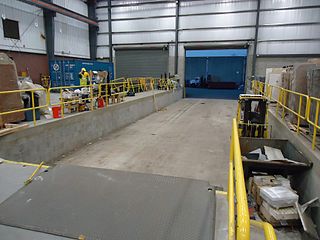
A warehouse is a building for storing goods. Warehouses are used by manufacturers, importers, exporters, wholesalers, transport businesses, customs, etc. They are usually large plain buildings in industrial parks on the outskirts of cities, towns, or villages.
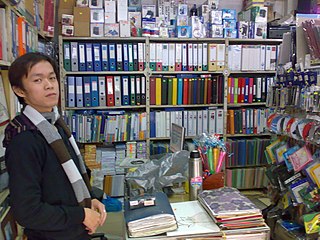
Office supplies are consumables and equipment regularly used in offices by businesses and other organizations, by individuals engaged in written communications, recordkeeping or bookkeeping, janitorial and cleaning, and for storage of supplies or data. The range of items classified as office supplies varies, and typically includes small, expendable, daily use items, consumable products, small machines, higher cost equipment such as computers, as well as office furniture and art.
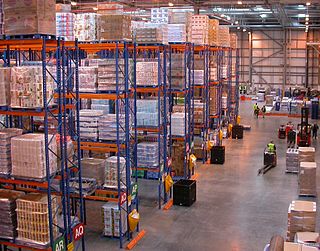
A distribution center for a set of products is a warehouse or other specialized building, often with refrigeration or air conditioning, which is stocked with products (goods) to be redistributed to retailers, to wholesalers, or directly to consumers. A distribution center is a principal part, the order processing element, of the entire order fulfillment process. Distribution centers are usually thought of as being demand driven. A distribution center can also be called a warehouse, a DC, a fulfillment center, a cross-dock facility, a bulk break center, and a package handling center. The name by which the distribution center is known is commonly based on the purpose of the operation. For example, a "retail distribution center" normally distributes goods to retail stores, an "order fulfillment center" commonly distributes goods directly to consumers, and a cross-dock facility stores little or no product but distributes goods to other destinations.
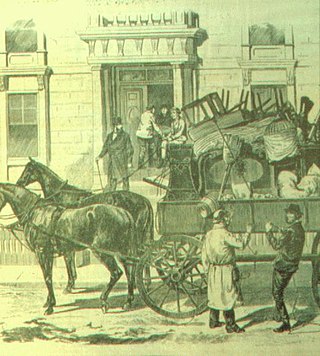
A moving company, also known as a removalist or van line, is a company that specializes in assisting individuals and businesses with relocating their goods from one location to another. Moving companies may offer additional or all-inclusive services for relocations, like packing, loading, moving, unloading, unpacking, and arranging of items to be shifted. Additional services may include cleaning services for houses, offices or warehousing facilities.

Self storage is an industry that rents storage space, also known as "storage units," to tenants, usually on a short-term basis. Self-storage tenants include businesses and individuals.

An automated storage and retrieval system consists of a variety of computer-controlled systems for automatically placing and retrieving loads from defined storage locations. Automated storage and retrieval systems (AS/RS) are typically used in applications where:

A bulk box, also known as a bulk bin, skid box, pallet box, bin box, gaylord, or octabin, is a pallet-size box used for storage and shipping of bulk or packaged goods. Bulk boxes can be designed to hold many different types of items such as plastic pellets, watermelons, electronic components, and even liquids; some bulk boxes are stackable.

Puppet is a software configuration management tool developed by Puppet Inc., which is owned by Perforce, which is owned in turn by venture capital firms. Puppet is used to manage stages of the IT infrastructure lifecycle.
Evidence management is the administration and control of evidence related to an event so that it can be used to prove the circumstances of the event, and so that this proof can be tested by independent parties with confidence that the evidence provided is the evidence collected related to the event.
A shipping container is a container with strength suitable to withstand shipment, storage, and handling. Shipping containers range from large reusable steel boxes used for intermodal shipments to the ubiquitous corrugated boxes. In the context of international shipping trade, "container" or "shipping container" is virtually synonymous with "intermodal freight container", a container designed to be moved from one mode of transport to another without unloading and reloading.
PODS, is a moving and storage company. Founded in 1998, it is based in Clearwater, Florida.
Bitcasa, Inc. was an American cloud storage company founded in 2011 in St. Louis, Missouri. The company was later based in Mountain View, California until it shut down in 2017.
Mail storage is a type of on-demand self storage whereby customers send items by mail or delivery service to be stored at a central location. It may be a viable option for people who prefer 'pay-as-you-go' storage, in which only items that are stored are charged storage fees, rather than renting a larger storage unit that may not be fully utilized.

SpareFoot is an Austin-based company that provides listings for self-storage units. The company was originally a person-to-person model, similar to Airbnb, that later developed into a marketplace for self-storage. The company now facilitates self-storage rentals between consumers and storage operators. The company was profiled as one of America's Most Promising Startups by Bloomberg Businessweek in 2011.

DigitalOcean Holdings, Inc. is an American multinational technology company and cloud service provider. The company is headquartered in New York City, New York, US, with 15 globally distributed data centers. DigitalOcean provides developers, startups, and SMBs with cloud infrastructure-as-a-service platforms.

Omni was an American tech-based on-demand storage and rental company based in San Francisco, California. Founded in 2014 by Aaron Wiener, Adam Dexter, and CEO Tom McLeod, Omni debuted its service in Fall 2015. Initially, the company focused on storage and space-management: customers would have their items picked up by Omni, which would categorize and photograph them. When the client wanted their item back, they would request to have it dropped off by Omni, possibly at an additional fee. Omni then expanded into offering other services such as the option to lend items to friends and the ability to rent out items for profit. As of July 2018, Omni was only available in the San Francisco Bay area, but had announced plans to expand into Portland, Oregon. Omni had raised around $39 million in investment, with nearly $15 million coming from traditional sources such as venture capital firms and approximately $25 million coming in the form of Ripple.
References
- ↑ "TechCity Insider "SpaceWays makes room for improvement"". Techcityinsider.net. 2014-08-28. Retrieved 2015-05-18.
- ↑ "TechCrunch "MakeSpace, A Dropbox For Real Life Storage, Launches In New York Today, Having Raised $1.3M"". TechCrunch.com. 2013-09-26. Retrieved 2015-05-21.
- ↑ "Reuters "Rocket Internet launches pick-up and storage business in Britain"". Reuters. 2014-07-03. Retrieved 2015-05-21.
- ↑ "TechCrunch "Samwer Brothers' Cloning Rocket Goes to Warp Speed"". Bloomberg. 2014-07-02. Retrieved 2015-05-22.
- ↑ Duffy, Jill (November 17, 2014). "Organize Your Stuff With These Apps and Services". PCMag. Retrieved 2019-05-13.
- ↑ Clark, Patrick (4 February 2016). "The Real Life Storage Wars". Bloomberg Businessweek .
- ↑ "TechCrunch "American Re-Urbanization Drives More On-Demand Innovation"". TechCrunch.com. 2014-12-16. Retrieved 2015-05-22.
- ↑ "New York Times "In a Crowded City, Storage Rooms With Amenities"". The New York Times . 2013-01-23. Retrieved 2015-05-22.
- ↑ "Asia One "Boom in self-storage industry"". AsiaOne Business. 2015-03-02. Archived from the original on March 5, 2015. Retrieved 2015-05-22.
- ↑ "Self Storage:On-Demand Storage Looks to Take Space". 11 April 2016.
- ↑ "How to Set Up and Use a Shipping Container for Storage or Moving". 1800westoreit.com.au. Retrieved 2023-09-12.